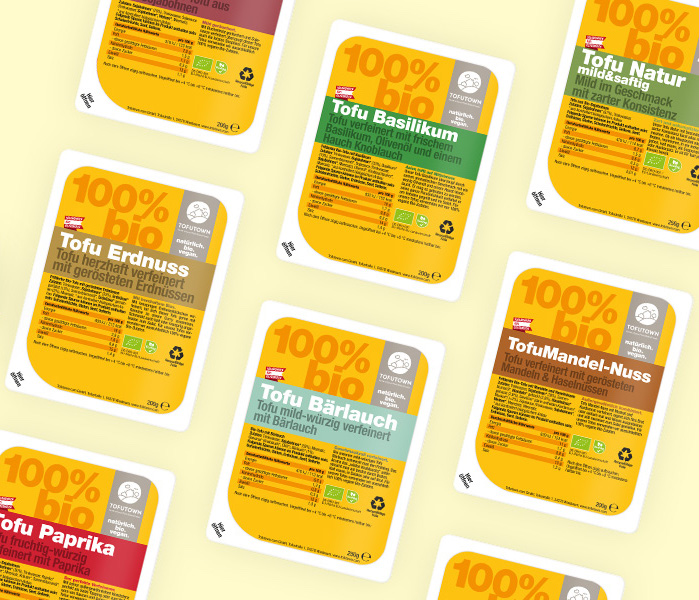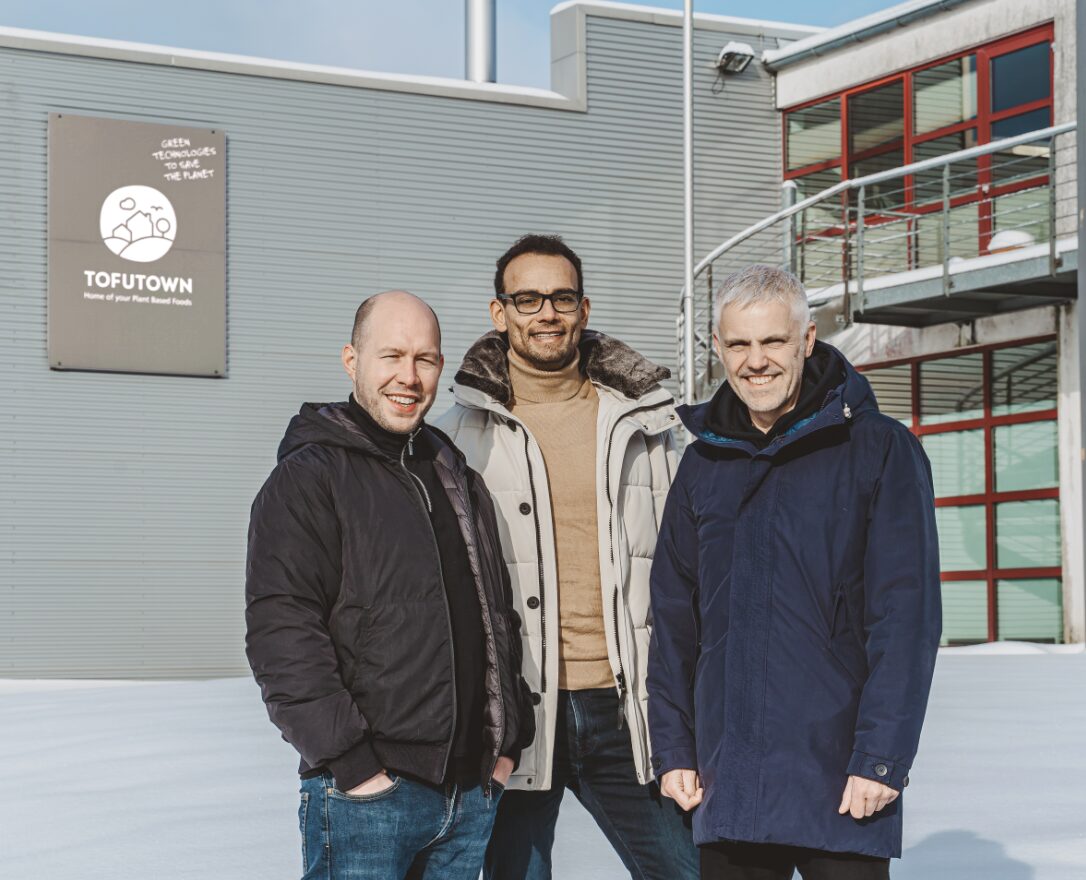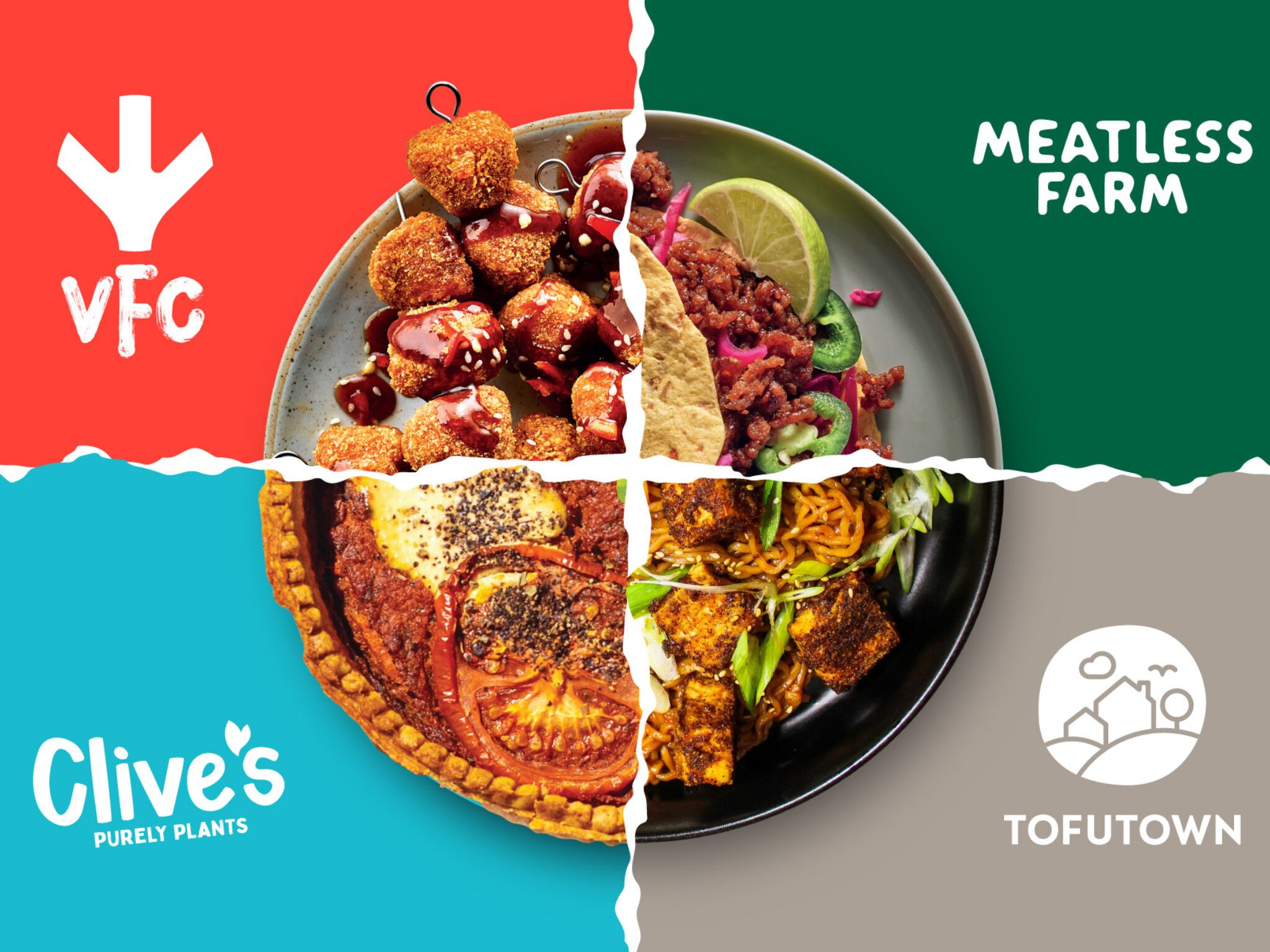Vegan Food Group to Acquire Germany’s Tofutown in Latest Consolidation Deal to Drive Profitability
6 Mins Read
Following its rebrand from VFC Foods last month, the newly formed Vegan Food Group is set to acquire German tofu manufacturer Tofutown for an undisclosed sum. With four businesses under its portfolio, the company aims to bolster revenue beyond €100M and become profitable this year.
The Vegan Food Group (VFG) will soon complete its third plant-based M&A deal in less than 10 months, taking over 35-year-old German brand Tofutown. The deal will allow VFG to scale up total revenues to over €100M and set it on a path to profitability this year.
It’s part of the company’s mission to become “a vegan Unilever”, as co-founder and chief mission officer Matthew Glover noted during the rebrand from VFC Foods last month. The move to become a holding company – which now comprises VFC, Meatless Farm, Clive’s Purely Plants, and Tofutown – allows VFG to become “one of Europe’s largest plant-based manufacturers”, and the latest acquisition delivers on CEO Dave Sparrow’s promise that there would be more takeovers to come.
“VFG will now be a major player in plant-based food, with a significant manufacturing scale across three sites, employing over 300 staff, and with a strong network of strategic manufacturing and supply chain partners,” said Sparrow. “This acquisition allows VFG to fast-track our growth across the UK and the EU in chilled, frozen, and ambient products, in both branded and own-label retail, as well as foodservice.”
“There’s a number of reasons why we saw Tofutown as an attractive addition to the Vegan Food Group,” Glover told Green Queen. “The fact that Germany is the biggest market for plant-based food in Europe was top of the list, providing so many opportunities to expand.”
He continued: “The tofu market has been one of the better-performing plant-based categories over recent years, and is expected to continue growing as consumers look for natural, clean-label plant-based protein sources. I’m a big fan of tofu myself, and eat it most days, so I’m excited about the opportunity to bring high-quality tofu to the UK market.”
Why the Vegan Food Group decided to buy Tofutown

“The business already has significant scale with circa €60m revenue, 300 staff and manufacturing capacity, producing a wide range of 100% natural, organic tofu, spreads, and meat alternatives,” Glover said of Tofutown. “[Founder] Bernd [Drosihn] and the team have invested heavily over 40 years developing a business with distribution into major retailers and foodservice across Germany, which we can continue to develop.”
Headquartered in Wiesbaum, Tofutown supplies major retailers including Aldi, Lidl, DM and Edeka. It has two manufacturing sites sprawling a combined 55,000 sq m, with the Lüneburg, Lower Saxony facility one of Europe’s largest plant-based factories, “with the capacity to produce a wide range of new plant-based lines”.
“Joining the Vegan Food Group is an exciting opportunity for Tofutown to successfully continue Bernd’s vision over the coming decades,” said Tofutown CEO Markus Kerres. “With Germany and the UK being the two biggest markets for plant-based foods, we’re well-positioned to thrive over the next decade.”
The tofu maker joins VFG’s growing family of vegan brands, a portfolio the company says will continue to expand with more M&As on the way. “We’ll be looking at opportunities to expand our brands into Europe through the distribution already in place, whilst expanding the current Tofutown product ranges into the UK market,” said Glover.
He revealed that VFG is already in talks with major UK retailers, who have shown interest given its new manufacturing prowess. “The beauty of having significant manufacturing capacity and expertise, is we can listen to our customers and create the products that consumers are buying,” he said.
“The business also has an existing senior management team in place with an enthusiasm to grow and learn as part of a wider group structure. We’re very excited about how we can merge the startup culture of VFC and Meatless Farm, with the established nature of a food company where manufacturing and delivering high-quality food is second nature.”
Speaking of which, Glover hinted that the company could look into developing co-branded products. “We’ll be looking at a variety of ways to enhance the brands, and co-branding opportunities could be a possibility,” he said, confirming that Meatless Farm and VFC will enter the German market now, as a base for wider EU expansion.
Consolidation deals ‘vital’ for rapid plant-based growth

VFG was launched in 2020 as a vegan fried chicken brand by Glover and Adam Lyons, and after witnessing strong growth, has evolved from a challenger brand into a sector leader. Last year, the group rescued plant-based meat company Meatless Farm from the brink of bankruptcy, purchasing the latter in a £12M deal for its UK operations (VFC paid just a small portion of the sum, keeping the brand assets intact).
This was followed by the acquisition of Clive’s Purely Plants in October, which positioned VFC as “a formidable player” in the market, according to Sparrow. “What excites us the most is the diverse range of products we can offer consumers, from enticing meat alternatives to wholesome and delicious vegetable-based options, making us one of the most diversified players in the category,” he said at the time.
Moreover, 2023 saw VFG’s sales value grow exponentially by 199.3%, according to NielsenIQ data for the Grocer’s Top Products survey. However, it still represented a small chunk of the overall UK meat-free sector, which experienced major headwinds in a consumer landscape hit by the cost-of-living crisis. Vegan meat analogues were among the worst-performing grocery categories in the country, with sales declining by £38.4m, and volumes down by 4.2%.
With manufacturers like Plant & Bean and LoveSeitan ceasing operations – and VBites being bailed out of administration – and Nestlé and Heck pulling products from their plant-based meat ranges, it’s been a challenging year, and that’s before you take note of the lack of investment in the space. Glover noted that while the decline isn’t as severe as in the US, it’s still disappointing, and ascribed it to multiple factors, including the cost-of-living crisis, meat industry misinformation campaigns, products not meeting expectations, and retailers reducing shelf space.
“In the context of flat or declining category demand, consolidation, and M&As are vital for rapid growth in the plant-based sector. These strategies allow companies to scale, innovate, and navigate through resilience challenges more effectively,” explained Glover, who is also the co-founder of Veganuary. “Combining resources and expertise through M&As enables businesses to expand their market presence and improve supply chains efficiently, which is crucial when organic growth is hard to achieve.”
He added that in a tough fundraising environment, acquisitions allow brands to circumvent the risk of running out of operational cash, save valuable product lines, and emerge stronger from the current market slump. “Ultimately, consolidation and M&As are not just about growth; they’re about sustaining the innovation and competitiveness of the plant-based sector in a rapidly changing market,” he noted.
VFG’s purchase deal with Tofutown, which will see the former acquire all shares, is pending final authorisation, but is expected to close soon. It is the latest in a rapidly growing line of M&A deals in the vegan sector, including Australia’s v2foods’ buyout of ready meal brands Soulara and Macros, Indian company Nourish You’s purchase of alt-dairy startup One Good, and Next Level Burger’s acquisition of Veggie Grill (and its Más Veggies taco chain) in the US – all of which have come in the last couple of months.
“The signs are that the declines are reducing, and I think we’ll be cheering the news that the categories will be back in growth during this year,” predicted Glover. “The economic climate generally seems to be improving, and there are some powerful advocacy programmes, which should help reengage consumers to the category,” he added, noting that it will still be a tough year for plant-based businesses.
“Whilst it’s a tough trading environment, I do feel like we’re soon to be over the worst of it. The planet and the animals need us to be successful, and I’m confident we will be.”
This story was updated on February 28 to include additional commentary from the Vegan Food Group co-founder Matthew Glover.



